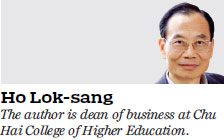Universal pension plan still has legs
Updated: 2017-01-24 07:32
By Ho Lok-sang(HK Edition)
|
|||||||||
Ho Lok-sang writes that the government can have a universal plan that doesn't squander public money on the well-off
To some people, one major disappointment over the latest Policy Address is that the universal pension plan idea seems to have been dropped by the government. According to the government, the well-off can secure their own post-retirement living. Rather than spending public money on those who can take care of themselves, by focusing on the needy it is possible to give them greater support. To my knowledge, most economists are with the government in this regard. Indeed, 78 economists signed a petition against then governor Chris Patten's proposal for a universal, pay-as-you-go type pension plan in 1994. Their concern is that such a plan will not be fiscally sustainable. Most economists agree that any public subsidies should only go to the deserving. Squandering money on the undeserving is irresponsible and will do no good for Hong Kong over the longer run.
I did not sign that petition in 1994, because I think there is a good case for universal pension. But I objected to the so-called "scholars' plan", which would have the government pay everybody the same amount starting from the "retirement age", or whatever age from which the pension is payable.

I also agree with the government that public subsidies should only go to the deserving.
The objection from the "scholars'" camp is that their actuaries had demonstrated that their plan is fiscally sustainable. I will not buy this argument because such demonstration is based on assumptions that may be completely wrong. There is much uncertainty over demographics over the long term. In particular, people may live much longer than is assumed. More serious is the fact that when times are fine and an operational surplus accumulates, there will be pressures to increase the pension. Since those who benefit will outnumber those who have extra net taxes to pay, it may be difficult to resist the demands. While a very small pension will certainly be sustainable, a bigger pension may not be. Some supporters of the pay-as-you-go universal pension plan also say that if longevity increases, the age when benefits start may be postponed. But when such time comes, the political pressures to resist postponing the pensionable age may mount. It is a crisis in waiting.
Thus, if there is a universal pension plan, there has to be an internal mechanism built in, so that the plan is indeed sustainable over the long term and so that the aforesaid political pressures will be contained.
I had come up with exactly such a plan, and I had recommended it to Professor Chow Wing-sun, who led a study commissioned by the government on retirement protection that was published in 2014. I discussed my plan with Chow and his team at length. But it was not even commented on or mentioned in his report. My proposal includes targeted subsidies - which is the principle espoused by the current administration. It is a universal pension plan, which is what the "scholars" demanded. However, because it is not a pay-as-you-go plan, it answers the concern of the 78 economists. As a fully funded plan, it has a built-in mechanism to avoid populist demands to raise pension benefits. So it is certainly sustainable and not at risk of being rendered overly generous.
Under my proposal, government subsidies will only go to the deserving. The well-off will get their pensions too, but the pensions that they collect reflect how much they contributed, and that on average they only collect their own contributions and the return on investment. The poor of course will get the same pensions, but their contributions are partly or completely subsidized. Because there is a legal requirement that collections should be no more than contributions plus the investment returns from those contributions, this is a "fully funded pension plan". If people demand a bigger pension, they will need to make a bigger contribution, which can be easily calculated if we have the rate of return.
It is clear that this plan does not involve squandering subsidies on the well-off, who can take care of themselves. Yet it is a universal plan. I would propose that the working spouse should also contribute on behalf of the spouse who stays at home to look after children. This spouse without earned income may also receive subsidies from the government. So the "pension plan" is more an "old-age living allowance" than a pension plan for retired workers.
But why not just pay the poor old as the government now suggests? My simple answer is this: A funded plan is superior to an unfunded plan. The government has proposed giving a maximum of HK$3,435 per month for a single person whose assets are less than HK$144,000. For elderly couples, the asset limit for this enhanced allowance is HK$218,000. But the government will need to come up with the resources to meet the needs as the claims are filed. So this is a pay-as-you-go plan whose cost is unknown! Since there is a strong incentive for people to draw down their savings before retirement so as to qualify for the enhanced Old Age Living Allowance, it is quite likely that the cost will exceed estimates that did not allow for this hazard. For most workers whose Mandatory Provident Fund balances are not really that big, drawing down their savings in order to qualify for the higher old-age allowance will be very attractive.
(HK Edition 01/24/2017 page1)